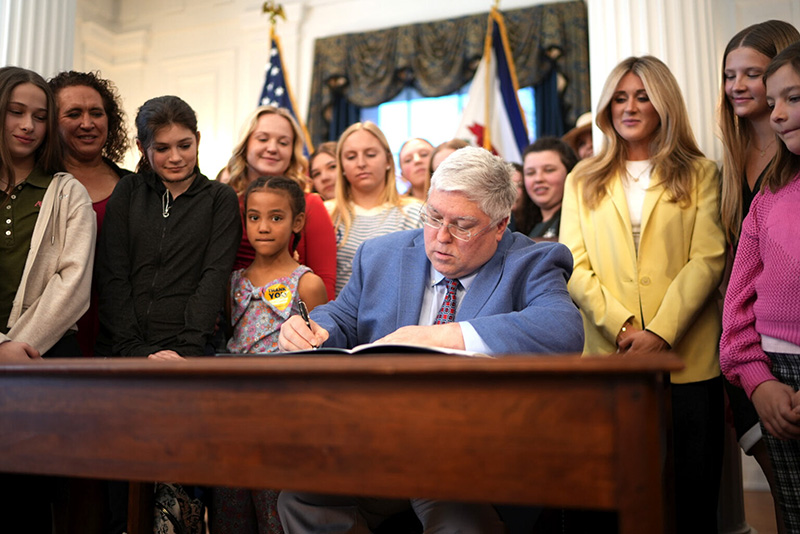Dropping the GOP
David Catania's new political life as an independent
In the summer of 1910, Theodore Roosevelt gave a speech in a small town in Kansas. No one knew then that Roosevelt — who left the presidency a year earlier — would exit the Republican Party in 1912, or that this “New Nationalism” speech would become the platform of his breakaway National Progressive Party.
The little Kansas town is Osawatomie. David Catania knows it well. It’s his mother’s hometown, and he spent some of his childhood there.
But while Catania isn’t in Kansas anymore, his link to Roosevelt is still strong.
He joined the 13-member D.C. City Council in 1997, winning his at-large seat in a special election. That surprise win turned to solid, ongoing support as voters reelected Catania again in 1998 and 2002. That’s no small feat for a Republican politician in a city where 75 percent of registered voters are Democrats, versus 8 percent Republicans.
 |
Catania serves today as one of two openly gay council members — and now as its only independent. The number of elected gay politicians in America remains the same, but the number of elected gay Republicans has dropped by one.
“Today marks the end of my journey as a Republican,” Catania announced Wednesday, Sept. 29. “On a personal note, this decision is extremely painful and difficult. It will almost certainly lead to a loss of cherished friends within the Republican Party for whom I have an enormous amount of respect and gratitude. In spite of this fact, I will no longer rationalize my association with a political party that has so badly betrayed my values and principles.”
By leaving the party, Catania follows in Roosevelt’s footsteps. It’s no wonder the council member has a special respect for the 26th president.
“From a historical perspective, my favorite president was Theodore Roosevelt,” says Catania. “He best captures the values that I share. He was an amazingly courageous and fair president. Some of the things he stood for have been lost on the Republican Party today.
“Roosevelt ultimately decided he had to leave the party. He began speaking about ‘new nationalism’ and how we needed to dedicate ourselves to constructing ‘new citizens.’ By virtue of that, he drove right down the middle of the political street. We don’t have that much anymore in American politics. He really did care deeply about what this country ought to be about: fairness, objectively focusing on improving the country. That has been lost.”
Catania’s Sept. 29 statement primarily charges the Republican establishment with exercising anti-urban policies, rather than hurting gay Americans. It’s easy to see how Catania applies a Roosevelt-inspired brand of progressive Republicanism.
“As one of a handful of successful urban Republicans in the nation, I fought to be a conduit of ideas to the national Republican Party to be used to re-engage the party of Lincoln in the plight of our cities” Catania said. “It was impossible for me to believe that the Republican Party’s indifference to our cities was intentional.”
Roosevelt left the Republican Party in order to run for the White House against his presidential successor and one-time friend William Taft. Roosevelt was alarmed by the direction Pres. Taft was taking his party and the country.
In the same vein, Catania says something today has gone sour in the GOP, which he believes is absolutely synonymous with the George W. Bush administration. “There is no difference,” he insists. “The administration is the party right now.”
The statement makes no direct mention of Catania’s criticism of Bush’s support of a Constitutional amendment to prohibit same-sex marriage, or any other gay-related issues. Nevertheless, those are the issues that have led to the most public rifts between Catania and the GOP.
Catania led the city council’s unanimous March measure opposing the amendment. “I am pleased to be joined by all of my colleagues in opposition to this despicable assault on the Constitution and thousands of American families,” Catania said at the time.
In 2001, Catania also asked congressional Republicans to back off a proposal that would prevent D.C. from disassociating from the Boy Scouts of America due to that group’s anti-gay policies. Notably, Catania did not argue against BSA policy, but that Congress should not undermine the district’s own judicial processes.
As one of the 12 gay Republicans — the “Austin 12” — who met with then-Gov. Bush during the 2000 presidential campaign, Catania has reason to be particularly affected by actions of the Bush administration. After all, Catania helped to put Bush in the White House. Catania claims to have raised $70,000-$80,000 for the president’s successful election campaign in 2000.
“When we met with Bush in April 2000, this was the first Republican nominee to sit down with gay and lesbian activists,” Catania explains, adding that Democrat Bill Clinton’s record on gay issues was not stellar during his pre-presidential years as governor of Arkansas. “We viewed then-Gov. Bush’s willingness [to meet with us] as the start of a long process. We weren’t kidding ourselves. We asked for certain commitments.Â… Bush agreed. Given the time and place, it was somewhat historic.”
Today, Catania the independent amplifies the tone of Republican Catania’s discontent. “We now know that was misplaced trust,” he insists. “I don’t think any reasonable gay or lesbian person can now support [Bush] with a straight face.”
While Catania eagerly signed-on to the party to advance a Roosevelt Republicanism, he says that he has increasingly felt alienated by the direction the Republican establishment is moving.
“This is the most transparent class warfare I’ve ever witnessed. [Republicans] make no mistake that they really don’t care about the other side,” Catania argues. “Roosevelt believed, for instance, that it was important to pay a person a decent wage. If a person has to work two, three, four jobs to support his family, that person is not there for his family.Â… Republicans have allowed minimum wage to remain constant for seven years.”
Despite Catania’s charges against today’s GOP, and Catania’s suggestion that his political realignment could cause a rift with former colleagues, at least two prominent D.C. Republicans are wishing him well.
Betsy Werronen, chairman of the D.C. Republican committee, earlier crossed public paths with Catania over the party’s national convention held in New York last month. Werronen blocked Catania from serving as a delegate after he announced he would not support Bush at the convention. Catania officially pulled his support for Bush shortly after Bush lent his support to the proposed constitutional amendment to prohibit same-sex marriage.
Intra-party feuding aside, Werronen says she supports Catania.
“I anticipated for a long time that this was coming,” Werronen admits. “We’re certainly very disappointed that David has chosen a different course. We’ve been with David since 1997 when he first ran for office. We’ve given him our time, efforts and hearts. He’s chosen a different path and we wish him well.”
Werronen did add, however, that she thinks some who feel similarly to Catania can still work for change from within the party. “I think it’s more about David [than the party],” she says. “When you’re part of a political party, there are few that agree with every single tenet or platform of the party.”
Carol Schwartz, now the sole remaining Republican on the D.C. City Council, says that’s the tack she’s taking. Although Schwartz resigned as a convention delegate to show her support for Catania, she says she has no intention of leaving the party.
“I think about itÂ…but I can’t agree with all the policies of any party,” Schwartz offers. “I’m truly an ‘independent’ myself. But I think it’s more helpful to my constituents — and that’s the entire city — to be in one of the national parties. When I go up on the Hill to lobby, like to keep gay adoption, I know it’s helpful to be a Republican. I can be more effective being a Republican.”
Schwartz’s new solo role on the council may be all the more pronounced, considering the personal relationship she’s shared with Catania.
“He came in as a volunteer on my ’94 mayoral campaign,” Schwartz says, pointing to their 10-year history. “I think he’s certainly an engaged, very smart legislator. I’m sorry to lose him. I think he was a real asset to the party, locally as well as nationally.
“We’re dear friends. There’s a real bond between us. Regardless of politics, there will always be a real bond between us.”
Though he may still have friends on the other side of the line he’s just stepped over, Catania doesn’t see a very amicable landscape when he looks back.
“I don’t think there is any interest in the GOP to change,” he says. “It’s completely lost touch with any constituency that isn’t Southern, white and male. It’s reached a pinnacle where we have a Southern strategy, to the exclusion of every other race, gender and region. Â… I have plenty of fault with this party for having really betrayed its past. The early brand of Republicanism is what I believe — it hasn’t changed. This party has taken such a detour from its past.”
Catania’s initial release regarding his change of party warned that he might face a “loss of cherished friends” within the party. So far, however, reaction has been largely favorable.
“It’s been universally positive,” he says. “I’ve been inundated with positive responses. I haven’t gotten a single negative response. The e-mails I’ve received have been an avalanche of positive e-mails.”
“From a very personal perspective,” he adds, “being relieved of that albatross, it’s a great personal relief to me to be rid of it all.”
On a practical level, Catania reckons that registering as an independent won’t have any negative impact on his political career.
“I don’t believe that I will suffer any adverse effects,” he guesses. “The Republican Party isn’t exactly a powerhouse in this city. At this point, having served for seven years, the people of this city know what I stand for. I can’t imagine it will have a major impact one way or another. I don’t think many people care if I’m an independent or a Republican.”
That said, it seems Catania may be spending more time in the immediate future focused on Bush’s political career rather than his own.
“I think Bush has made it clear that the best interests of gays and lesbians don’t matter to him,” Catania says. “I don’t even want to speculate as to what another four years would look like. There will be plenty of time to contemplate that if we fail. Â… Look, given the choices that we have, Kerry is a better candidate. By way of background, demeanor, temperament, I believe Kerry to be the better candidate.”
Catania is backing that belief by joining the Gertrude Stein Democratic Club, a local gay group, on the campaign trail. The group will join gay Democratic groups in Pennsylvania through October to campaign for Democratic presidential candidate, Sen. John Kerry. Gertrude Stein President David Meadows says Catania has pledged a weekend to the effort, dubbed D.C. Rainbow Riders.
Catania’s distaste for Bush’s GOP and support for the Kerry campaign should not be mistaken for realignment with the Democratic Party. Catania says he’s happy where he is. With two seats on the council reserved for non-Democrats, it may make more sense for Catania not to register as one.
For the time being, however, Catania needn’t worry about his seat on the council. He won’t be up for reelection until 2006. Meanwhile, the plaudits are still coming. The Human Rights Campaign, the country’s preeminent gay-rights advocacy group, will honor Catania at the group’s seventh annual national dinner in Washington this Friday, Oct. 8. Catania is slated to receive the HRC’s National Capital Area Leadership Award for his criticism of Bush over the proposed marriage amendment.
There may be some dust to settle yet, but so far Washington’s unaffiliated council member has no regrets: “I think being an independent is going to suit me just fine.”
Support Metro Weekly’s Journalism
These are challenging times for news organizations. And yet it’s crucial we stay active and provide vital resources and information to both our local readers and the world. So won’t you please take a moment and consider supporting Metro Weekly with a membership? For as little as $5 a month, you can help ensure Metro Weekly magazine and MetroWeekly.com remain free, viable resources as we provide the best, most diverse, culturally-resonant LGBTQ coverage in both the D.C. region and around the world. Memberships come with exclusive perks and discounts, your own personal digital delivery of each week’s magazine (and an archive), access to our Member's Lounge when it launches this fall, and exclusive members-only items like Metro Weekly Membership Mugs and Tote Bags! Check out all our membership levels here and please join us today!






















